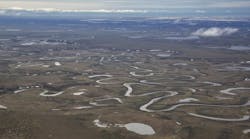By OGJ editors
HOUSTON, Oct. 28 -- BP PLC plans to join Jordan’s state-owned National Petroleum Co. (NPC) to exploit the onshore Risha concession in northeasternmost Jordan.
Subject to government and parliamentary approval, BP is to farm into the Risha concession as a partner with NPC. The concession borders Syria, Iraq, and Saudi Arabia.
The Risha concession, awarded by the government to NPC, covers about 1.7 million acres. The concession includes Risha gas field, 170 miles northeast of Amman, where the first successful wells were drilled in the late 1980s.
BP said it will conduct initial exploration and appraisal work that will involve shooting seismic, working on existing wells, and drilling new wells. If that is successful, then the company will move to agreeing on a substantive development.
The gas reservoir appears to be tight sandstones of Lower Paleozoic (Ordovician or Silurian) age at 8,000-8,500 ft. Several Risha wells are nearly astride the Jordan-Iraq border.
Husseini et al. wrote in 2007 that Jordan’s Paleozoic Risha field produces 30 MMcfd of gas from more than 30 wells. BP said the present rate is more than 20 MMcfd.
It extends across a 10 by 50 km area, “but the reservoir is a thin sheet of complex sandstones in faulted glaciofluvial channels, ranging in thickness from 2 to 12 m. Its proven reserves are 180 bcf of gas, the equivalent of only 32.4 million bbl of oil” (OGJ, July 2, 2007, p. 40).
Indications are that Risha shares similar geology with the undeveloped Akkas discovery about 125 miles east in Iraq’s western desert.

